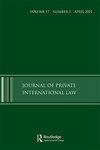A return to the doctrine of forum non conveniens after Brexit and the implications for corporate accountability
IF 0.5
Q3 LAW
引用次数: 1
Abstract
On 1 January 2021, the European Union’s uniform laws on jurisdiction in cross-border disputes ceased to have effect within the United Kingdom. Instead, the rules governing jurisdiction are now found within the Hague Convention 2005 where there is an exclusive choice of court agreement and revert to domestic law where there is not. Consequently, the doctrine of forum non conveniens applies to more jurisdictional issues. This article analyses the impact forum non conveniens may have on victims of human rights abuses linked to multinational enterprises and considers three possible alternatives to the forum non conveniens doctrine, including (i) the vexatious-and-oppressive test, (ii) the Australian clearly inappropriate forum test, and (iii) Article 6(1) of the European Convention on Human Rights. The author concludes that while the English courts are unlikely to depart from the forum non conveniens doctrine, legislative intervention may be needed to ensure England and Wales’ compliance with its commitment to continue to ensure access to remedies for those injured by the overseas activities of English and Welsh-domiciled MNEs as required by the United Nation’s non-binding General Principles on Business and Human Rights.英国脱欧后不方便法庭原则的回归及其对企业问责制的影响
自2021年1月1日起,欧盟关于跨境争端管辖权的统一法律不再在联合王国境内生效。相反,管辖管辖权的规则现在是在2005年《海牙公约》(Hague Convention 2005)中找到的,其中有一个排他性的法院选择协议,如果没有,则恢复到国内法。因此,法院不方便原则适用于更多的管辖权问题。本文分析了不方便法庭可能对与跨国企业有关的侵犯人权行为的受害者产生的影响,并考虑了不方便法庭原则的三种可能替代办法,包括(i)妨害和压迫性检验,(ii)澳大利亚明显不适当的法庭检验,以及(iii)《欧洲人权公约》第6(1)条。作者的结论是,虽然英国法院不太可能偏离“不方便法庭”原则,但可能需要进行立法干预,以确保英格兰和威尔士遵守其承诺,继续确保根据联合国不具约束力的《工商业与人权一般原则》的要求,为在英格兰和威尔士定居的跨国公司的海外活动中受到伤害的人获得补救。
本文章由计算机程序翻译,如有差异,请以英文原文为准。
求助全文
约1分钟内获得全文
求助全文

 求助内容:
求助内容: 应助结果提醒方式:
应助结果提醒方式:


